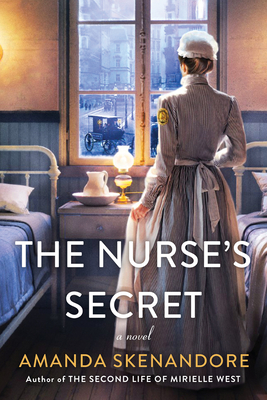
For our February meeting we (Linda, Colette, Betty, Marg, Sharon, Carla, Shirley) discussed Betty's book choice, The Nurse's Secret by Amanda Skenandore. Tonight's host Shirley provided some snacks to eat along with the book discussion: sausage rolls, goat cheese topped with pistachios, fig preserves and honey, and a Bakewell cake with ice cream for dessert.
Betty provided background on the author who has written four other books to date, including The Second Life of Mirielle West and Between Earth and Sky. Skenandore struggled with dyslexia in school and found reading difficult, but she persisted and says that even now she doesn’t read fast but reads often and wide. Coming from a family of readers and a family of professionals; she is an infection prevention nurse which gives credibility to the medical jargon in tonight’s book.
The Nurse’s Secret is set in New York in the so-called Gilded Age and is a stark depiction of the political corruption of the time, the two distinct classes – extreme wealth and extreme squalor. This was a time, 1873, when Bellevue Hospital started to train nurses instead of using convicts to staff the hospital. The main character of the story, Una Kelly, who is talented pickpocket, liar, and grifter decides to hide in plain sight as a nurse trainee when she is accused of a murder she did not commit.
This is a historical novel with a murder mystery, albeit one where the murderer is telegraphed early in the story. There were a few incredulous incidents with respect to solving the murder which was a detraction from the story. The characters, however, are well described and well developed. It was noted by some that the opening section where we meet Marm Blei held an uncommon similarity to Charles Dickens’ Fagan. The description of the medical procedures of the time were interesting as it was a time when Lister’s new concept of cleanliness was dismissed as being radical and totally unnecessary. Yikes!
Una, in her life as a loner and a thief, has set herself Rules, many Rules, to live by. Her first rule of survival on the streets was to ‘keep your head down and look out for yourself’. Over the course of the story, Una is transformed under the tutelage of her roommate Dru and begins to see the benefits of helping others.
Thank you, Betty, for introducing us to this author and this book with so many points of discussion.










